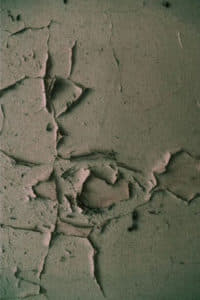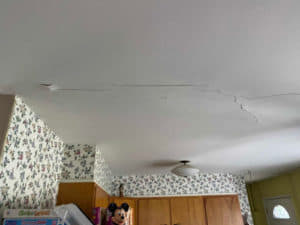Originally posted on 4/29/19; updated by Kelly Kater on 8/06/20
I don’t like hot weather. Summer is my least favorite season, and I absolutely refuse to live in a home without both central air and ceiling fans. Using a ceiling fan requires cleaning the blades fairly often, which means I’m up close and personal with my ceiling on a regular basis.
How often do you look at your ceiling? Have you noticed something other than dust? Cracks in your ceiling can indicate a wide range of problems for your home, and for the average person it can be difficult to correctly interpret them.
Acculevel is a foundation repair company, started in 1996 by Andy Beery. Based in central Indiana, we’ve repaired tens of thousands of homes in the Midwest. In many cases, homeowners didn’t realize they had an issue until major warning signs appeared. But if you know what to look for, you can recognize early symptoms and get the issue corrected before it becomes a costly repair.
In this article, we’re going to review the different types and causes for ceiling cracks. We’ll explain when they are- and aren’t- indicative of a larger issue. We’re also going to provide additional resources for you, in the event you have a cause for concern.
Cracks That Are Not Related to Foundation Issues
Damp or Leaking Cracks in the Ceiling
If the crack in your ceiling is discolored, leaking, or showing other signs of moisture, you need to find the source of the water. The most likely culprits are compromised plumbing or roof damage. Your first priority should be to identify the leak and repair it. You’ll also want to evaluate the area around the leak for water damage: mold, decaying wood or drywall, etc. Some of these materials may need to be professionally cleaned or replaced.
Straight Thin Cracks in a Drywall Ceiling
Sometimes drywall is not correctly installed, or the “mud” was not properly applied. This can allow the tape to come loose. The straight thin line you see isn’t actually a crack- it’s the edge of tape or the seam between drywall sheets. This is a minor issue that’s largely cosmetic and can be an easy (if inconvenient) DIY repair. The tape will need to be removed and replaced. Then you’ll apply new mud, sand, and repaint.
Small Cracks in a Plaster Ceiling
Small cracks in plaster can mean moisture is affecting the wooden beams in your attic. Moisture and temperature variations cause wood to expand and contract. This movement may be enough to shift your ceiling and cause the plaster to crack. Smaller cracks can be patched relatively easily. If the cracks are large, you may need to redo the plaster or replace it with drywall. A whole-house dehumidifier can greatly reduce the effect of seasonal changes in humidity; we review the benefits of a dehumidifier in this blog.
 This plaster ceiling is cracking and showing signs of water damage.
This plaster ceiling is cracking and showing signs of water damage.
Ceiling is Cracking and Sagging
This is a more urgent issue, and you should have it evaluated by a professional as soon as possible. Each level of your home consists of beams and joists that hold the floor/ceiling in place. A sagging ceiling indicates that this framework is damaged or compromised.
This can be caused in a number of ways, which is why you should get a professional opinion. Maybe you remodeled the upstairs bathroom and the new tile is heavier than the old vinyl. Or you have a leak from the roof, and it’s rotting the wooden components.
A professional contractor will need to evaluate the structure and help you determine the best way to correct the issue.
Cracks That May Be Related to Foundation Issues
Spiderweb Type Cracks
Spiderweb cracks are cracks that begin with one central crack and stretch outward.
If they are very thin hairline cracks: then they are probably a result of normal settling. All homes will settle, regardless of age or quality of construction. Your foundation, combined with the home’s overall weight presses down on the earth. No matter how well the soil was tamped before construction began, the soil will shift a bit over time.
If they are wider: larger spider web cracks can indicate a structural issue, such as the foundation settling due to erosion. Make sure these are not accompanied by moisture leaks, then check your home for other signs of settling; please look for cracks that are also moving down the wall (explained in the next section).
 This photo was taken by an Acculevel project manager during a routine estimate appointment. This spiderweb crack indicates the foundation is settling. The windows in the room were difficult to open, another sign of settling.
This photo was taken by an Acculevel project manager during a routine estimate appointment. This spiderweb crack indicates the foundation is settling. The windows in the room were difficult to open, another sign of settling.
Vertical Cracks or V Shaped Cracks
If you have long, vertical cracks that begin in the ceiling and travel down the wall, this means you are more likely to have a structural problem with your home. These cracks are often wider at one end, creating a “V” shape as they expand. Vertical cracks can be signify one of two issues:
- Check the windows and doors in the room; do they open or close easily? If they are sticking, this is most likely a settling issue. For more information about settling foundation problems, please review this blog.
- If the windows and doors work properly, examine your floor. Look for small gaps between the baseboard and floor, or roll a marble along the floor to check for dips or sags. We cover sagging floor symptoms and costs in this article.
Do You Need Foundation Repairs?
If the cracks in your ceiling are minimal or easily repaired, that’s great! Practice good home maintenance by giving your home a “check up” each spring and fall. We have a DIY foundation inspection checklist that will guide you through a thorough evaluation of your home and help you catch any potential issues before they escalate into high-dollar repairs.
However, if the cracks in your ceiling indicate a more serious situation, you will need to find an experienced professional. Verify the company is reputable, insured, and accredited by the Better Business Bureau.
If you live in Indiana or the surrounding states, contact Acculevel. If you have noticed any problems and would like an evaluation, you can request a free estimate. An experienced project manager will examine the areas of concern and recommend the best course of action for you, to keep your home strong and healthy for years to come.


















